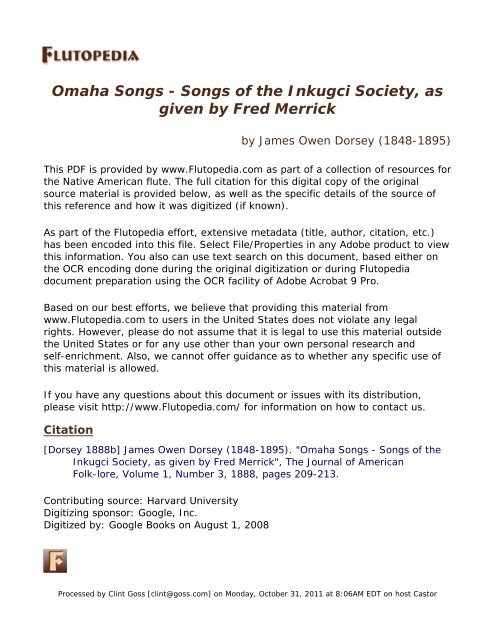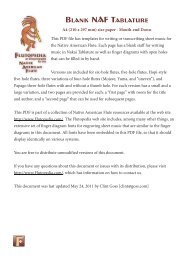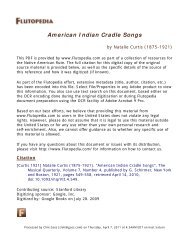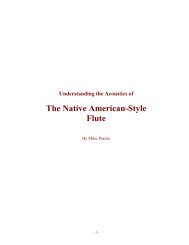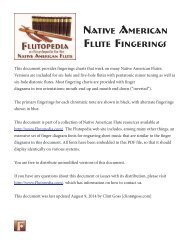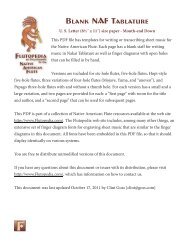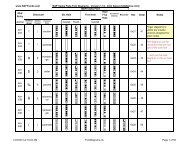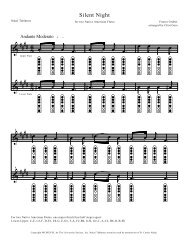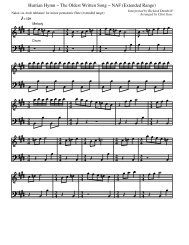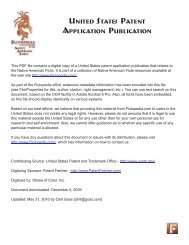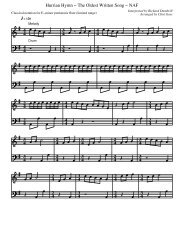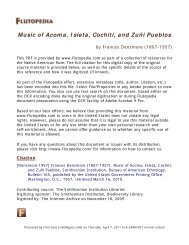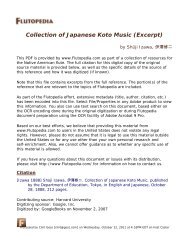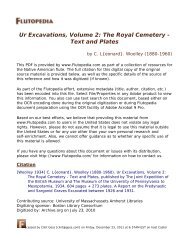Omaha Songs - Songs of the Inkugci Society, as ... - Flutopedia.com
Omaha Songs - Songs of the Inkugci Society, as ... - Flutopedia.com
Omaha Songs - Songs of the Inkugci Society, as ... - Flutopedia.com
You also want an ePaper? Increase the reach of your titles
YUMPU automatically turns print PDFs into web optimized ePapers that Google loves.
<strong>Omaha</strong> <strong>Songs</strong> - <strong>Songs</strong> <strong>of</strong> <strong>the</strong> <strong>Inkugci</strong> <strong>Society</strong>, <strong>as</strong><br />
given by Fred Merrick<br />
by James Owen Dorsey (1848-1895)<br />
This PDF is provided by www.<strong>Flutopedia</strong>.<strong>com</strong> <strong>as</strong> part <strong>of</strong> a collection <strong>of</strong> resources for<br />
<strong>the</strong> Native American flute. The full citation for this digital copy <strong>of</strong> <strong>the</strong> original<br />
source material is provided below, <strong>as</strong> well <strong>as</strong> <strong>the</strong> specific details <strong>of</strong> <strong>the</strong> source <strong>of</strong><br />
this reference and how it w<strong>as</strong> digitized (if known).<br />
As part <strong>of</strong> <strong>the</strong> <strong>Flutopedia</strong> effort, extensive metadata (title, author, citation, etc.)<br />
h<strong>as</strong> been encoded into this file. Select File/Properties in any Adobe product to view<br />
this information. You also can use text search on this document, b<strong>as</strong>ed ei<strong>the</strong>r on<br />
<strong>the</strong> OCR encoding done during <strong>the</strong> original digitization or during <strong>Flutopedia</strong><br />
document preparation using <strong>the</strong> OCR facility <strong>of</strong> Adobe Acrobat 9 Pro.<br />
B<strong>as</strong>ed on our best efforts, we believe that providing this material from<br />
www.<strong>Flutopedia</strong>.<strong>com</strong> to users in <strong>the</strong> United States does not violate any legal<br />
rights. However, ple<strong>as</strong>e do not <strong>as</strong>sume that it is legal to use this material outside<br />
<strong>the</strong> United States or for any use o<strong>the</strong>r than your own personal research and<br />
self-enrichment. Also, we cannot <strong>of</strong>fer guidance <strong>as</strong> to whe<strong>the</strong>r any specific use <strong>of</strong><br />
this material is allowed.<br />
If you have any questions about this document or issues with its distribution,<br />
ple<strong>as</strong>e visit http://www.<strong>Flutopedia</strong>.<strong>com</strong>/ for information on how to contact us.<br />
Citation<br />
[Dorsey 1888b] James Owen Dorsey (1848-1895). "<strong>Omaha</strong> <strong>Songs</strong> - <strong>Songs</strong> <strong>of</strong> <strong>the</strong><br />
<strong>Inkugci</strong> <strong>Society</strong>, <strong>as</strong> given by Fred Merrick", The Journal <strong>of</strong> American<br />
Folk-lore, Volume 1, Number 3, 1888, pages 209-213.<br />
Contributing source: Harvard University<br />
Digitizing sponsor: Google, Inc.<br />
Digitized by: Google Books on August 1, 2008<br />
Processed by Clint Goss [clint@goss.<strong>com</strong>] on Monday, October 31, 2011 at 8:06AM EDT on host C<strong>as</strong>tor
, .<br />
THE<br />
JOURNAL OF<br />
AMERICAN FOLK-LORE<br />
BDlTBD BY<br />
FRANZ BOAS<br />
T. FREDE~ICK CRANE J. OWEN DORSEY<br />
W. W. NEWELL, GENERAL EDITOR<br />
VOL~ I.<br />
~<br />
'f<br />
I<br />
BOSTON AND NEW YORK .<br />
~ for • Smttitan foIft:::¥on f,odttp btl<br />
HOUGHTON. MIFFLIN AND COMPANY<br />
LONDON: TRUBNER &: CO., 57 LUDGATE HILL<br />
1888<br />
i<br />
" t<br />
.1<br />
Digitized by Coogle
Omalza <strong>Songs</strong>.<br />
OMAHA SONGS.<br />
":'<br />
IL<br />
SONGS OF THE 11I-K.UGeI 1 SOCIETY, AS GIVEN BY FRED KERRICK.<br />
I. A man sings about <strong>the</strong> death <strong>of</strong> ano<strong>the</strong>r man's sister.<br />
In-da + lru-rta + !<br />
Ho, my friend I<br />
fti-lafi'-ge ei'-ki-a-rta-ha' ha-ha' I (fli:aafl.ge, your sister.. <strong>the</strong> rest<br />
{li-:Jaft'-ge ei'-ki-a-rta-ha' ha-ha' I may mean, .. she h<strong>as</strong> been<br />
(li-:aafl.'-ge ei'-ki-a-rta-ha' ha-ha'i separated from you, al<strong>as</strong> I")<br />
The third line is sung about half an octave lower than <strong>the</strong> second,<br />
and <strong>the</strong> l<strong>as</strong>t one about half an octave lower than <strong>the</strong> third. The<br />
final .. ha-ha' I .. in each line is sung in sixteenth notes.<br />
2. The explanation <strong>of</strong> this song w<strong>as</strong> not given. MaD¢iD, to walk,·<br />
flee he, tltis is tlte one. " H~" is <strong>the</strong> feminine oral period, so <strong>the</strong><br />
words may be those <strong>of</strong> a woman. Cude, smoke. The writer gives<br />
<strong>as</strong> a provisional rendering, "This is <strong>the</strong> one who walks. Smoke<br />
walks."<br />
Maal-rejD ¢e'-e he' I<br />
MaDf-rejD ¢e'-e he'!<br />
Cu-de' maD-rejD' ha-ha' I<br />
MaD'-rejD (le'-e he'!<br />
MaBl-rtiD fle'-e he' I<br />
Cu-de' maD-rtiDf ha-ha' r<br />
MaDf-rejD ¢e'-e he'l<br />
MaD'-rejD ¢e'-e he' I<br />
Cu-de' maD-¢iDf ha-ha' r<br />
SONGS OF THE BUFFALO SOCIETY. I<br />
GIVEN BY FRED MERRICK.<br />
I. Hu'-rej-ne' maD'-rtiD mau'! (If spoken, Ureine maD¢iDl ama' ()<br />
H ur -rej-ne' maD' -rtiD mau' I aeIdDg <strong>the</strong>y walk <strong>the</strong> pi.<br />
<strong>the</strong>m<br />
1IItij.<br />
Naft'-ge u-ki'-hi-me-rte'l (Nafi'ge uki'hi amee ha ()<br />
Hu'-rej-ne+ maDf-rtiD-me+ I ....:.:j:.r able :::r:.<br />
He-rejD<br />
Ha'-i-me' a'-bi flf! I<br />
Ha'.i-me' a/-bi ¢c'1<br />
The <strong>the</strong>me seems to be, "Those who walk seeking <strong>the</strong>m are <strong>the</strong><br />
ones (<strong>the</strong> buffaloes) who are able to run."<br />
2. Song given by Fred Merrick, and said by datiD-naDpajI to be<br />
very mysterious, <strong>as</strong> it is <strong>the</strong> song which <strong>the</strong> doctors <strong>of</strong> this society<br />
sing when <strong>the</strong>y spurt water into a wound, <strong>as</strong> when <strong>the</strong> patient h<strong>as</strong> a<br />
fractured bone. Denied by Joseph La FI~che and Two Crows, <strong>the</strong><br />
latter being one <strong>of</strong> <strong>the</strong> doctors <strong>of</strong> this society.<br />
1 These IDkugd people are those wbo shoot translucent stones at <strong>the</strong> candidates<br />
for initiation. See o.aAa S«iology, § 2,56, in Third An, Rep. Director Bur. Eth<br />
Dology.<br />
I OlllaAa SoeitJlogy. H 257. 258.<br />
VOL. I.-NO. 30 14<br />
Digitized by Coogle
SIO<br />
NiD'¢aD ¢a,-de' a-ma' I<br />
NjDI,.. rta-de' a,.ma' t<br />
Hi+!<br />
U-he'-ki~<br />
MaDl-¢i,D ge'-e,ee r<br />
NiDl¢aD ¢a.-de' a-ma'r<br />
Mi'~ hi+1<br />
.aGNG OF THE BOIlSE DANCING SOCIETY.1<br />
DU'-a-tet da-·be'l<br />
Du'-a-te' daDl .. ba-ga! I<br />
Hi+-¢i,+4i'.hi-ea' !<br />
Caft' -ge si' -gee daD' -ba-p' I<br />
Du'-a-te' daDl-ba-p'1<br />
Hi+t<br />
GIVEN BY PRED 1lEJUUC&.<br />
He seea tlUs collection <strong>of</strong> footprints.<br />
See thia collection <strong>of</strong> footprints I<br />
Hi + -¢i, + <strong>of</strong>ri-hi-ea !<br />
See <strong>the</strong> trail <strong>of</strong> horses r<br />
See this collection <strong>of</strong> footprints J<br />
Hi+!<br />
SONG OF THE GRIZZLY BEAR DANCING SOCIETY.-<br />
Wi'-naD maD-tcu' b¢iDl ode,<br />
HaDl-daD be'-gi-¢e-<br />
Wi'-naD maD-tcu' beiDl ode,<br />
HaDl-daD be'-gi-¢e-<br />
E'_ga D ~i'-a-~<br />
I'-ga ... e' e-he'l<br />
Xi-ni' ¢e'-k~ miD' e-gaD,<br />
Ha'-ni-te' ¢e !lo'!<br />
I'RBD MERRICK.<br />
GIVBH BY<br />
Though I alone am a grizzly bear,<br />
At night a stranger -<br />
Though I alone arna grizzly bear,<br />
At night a stranger -<br />
Like one (i. e., a stranger) at <strong>the</strong><br />
lodge<br />
Do be <strong>com</strong>ing, I say,<br />
Since I smoke this tobacco,<br />
I am alive (indeed I).<br />
~. The following love songs were dictated by Mr. Francis La Fl~che,<br />
now in <strong>the</strong> Indian Bureau.<br />
I. The <strong>com</strong>poser <strong>of</strong> this song deserted a Ponka woman, whom he<br />
had courted when he w<strong>as</strong> a youth. He made this aong in derision<br />
<strong>of</strong> her. It is sung in two ways: first, <strong>as</strong> a "song lengtbeRed in singing,"<br />
and <strong>the</strong>n <strong>as</strong> a" dancing song."<br />
If it were spoken, it would be thus, two linea representing <strong>the</strong> a<br />
proachea <strong>of</strong> <strong>the</strong> woman, and <strong>the</strong> o<strong>the</strong>rs <strong>the</strong> man's reply: -<br />
Wisi'¢~-da" axa'ge a'ttiDhe'!<br />
dahe' k~ a'ahe'-daD axa'ge a'ei-he' I<br />
When I think Of you, I am weeping<br />
<strong>as</strong> I go!<br />
When I go along <strong>the</strong> bluffs, I<br />
am weeping <strong>as</strong> I move I<br />
I 0 .... S«itJ/ogy • • 360-<br />
• Otllda S«illlogy, § 362. " Slmite" is "anita" in <strong>the</strong> spoken language.<br />
Digitized by Coogle
211<br />
You say that to me, 0 Niagiwaee!<br />
T~ I qaat~, ra'pi-ma'jl hi. Fie J <strong>as</strong> I regatd you <strong>as</strong> my<br />
grandmo<strong>the</strong>r, I am disple<strong>as</strong>ed I<br />
.su.c thus :-<br />
Wi'-si-Jle' ba-xa'-ge ba'~D-he' ~-e-ee+!<br />
Wi'-si-ee' ha-xa'-ge ha!~a_he' ee'-e-te+!<br />
CIa-he ke'-e ba'-ya-he'-djaD ha-m'-ge ha'~D-he+t<br />
Wi'-si~ ha-xa'-ge ha'~a_he' ee'-e-t/!e+1<br />
Hia4i al .._ge'-ce+, Ni'-a-gi'-wa-JI!e, biD~-ta-ge'-ce+ r<br />
T~I I bi_.aI_~a+, hiD+-pi-ma-;e+1 ee'-e-hl't<br />
When sung <strong>as</strong> a dancing song, it is in three verses, which, if<br />
spoken, would represent <strong>the</strong> woman and her lover <strong>as</strong> engaged in a<br />
dialogue, thus:-<br />
Sh. Wisi'e~-da" axa'ge a'taDhe'!<br />
When I think <strong>of</strong> you, I am weeping<br />
<strong>as</strong> I stand I<br />
Sh. TaalwaftgeaD ga'hiee'caD<br />
lta'gi'ifl'ge he<br />
~:ma" wi'kaab¢,a a'taDhe' I<br />
Wisi'ee.daa' axa'ge a'taDhe'!<br />
Wisi'e~a" axa'ge a'taahe' !<br />
8,. AD¢a'sie~ ~ e1:)Jte'gaḎma'jl hi. I do Bot think that you remember<br />
me.<br />
Yonder remote tribe (village)<br />
I do not regard it <strong>as</strong> <strong>of</strong> any value.<br />
Only you am I desiring <strong>as</strong> I<br />
stand I<br />
H,. AD¢a'sie~ t~ ebee'gaD-ma'jl hi. I do not think that you remember<br />
me.<br />
He. Ece' ¢a'ta ee' M. You are saying it <strong>as</strong> you stand,<br />
Nia'giwa'e~ ! 0 Niagiwaee !<br />
Ece' ea'taDce' Ill.<br />
AD¢a'siea'dt~ebee'gaD-ma'jlhl.<br />
You are saying it <strong>as</strong> you stand.<br />
I do not think that you rememberme.<br />
,/ a Gahi iDc'age's song. He represents a woman <strong>as</strong> singing about<br />
bimselL As he wished to marry her, he does not mention her<br />
Dame.<br />
Nu-daal ea-gei'-daD_yaal,l t'e-aa'-¢a-¢e'-e-ee-ee' l<br />
N u-daal ea-gl!i' -daD_yaal, t' e-a," -tta~-ee-e-¢e' !<br />
Na'-ya :>ne'-ye ti!'-di, WIi-ka--c:ta'-ya we'-ye-ka' ha'-taB-he' ~e' !<br />
Wa'-ka·-da1 ....', e'-he ha-taal-he4e'-&f$e+ I<br />
It t'e-a,at-¢a« ea'-ya-ya'-ya ha' I<br />
1 "Nud'" lJag~aa" is sung instead <strong>of</strong> " Nuda- eagr.i '(IjI," and "t'ea-,ad<br />
ef6." 7"" i,71 ""' illiketi, is substituted for "diwi~ ~," I, " fIHIIIIIIII, 1IIfI1.1f111<br />
{.. _> nl,y. The fature sign is wanting.<br />
•<br />
Digitized by Coogle
•<br />
212<br />
The above syllables are equivalent to <strong>the</strong> following, in <strong>the</strong> spoken<br />
language:<br />
NudaDl eag¢i' ,.t'jI, t'eaDl~e e'¢e r<br />
When you return from war,<br />
you (will) indeed kill me r<br />
:lne' tedi, Wakan'da ewe'l{a a'tallhe'e'¢e r Since you went, I have been<br />
<strong>as</strong>king a favor <strong>of</strong> W.<br />
kanda.<br />
Wakan'da, e'he a'taDhe' e'¢e r<br />
I have been saying, <strong>as</strong> I<br />
stood, 0 Wakanda r<br />
3. Wagall¢a's song. He tells <strong>of</strong> a woman who sings and confesses<br />
a mistake which she had made. Had she spoken, she would have<br />
said <strong>the</strong> following:-<br />
di'wi'¢c te i'bahaDbia',.i¢e e1¢e r I have indeed caused my love for<br />
you to be known !<br />
HaDladi u¢a'g¢a'a teean'eli, L<strong>as</strong>t night, when you hallooed,<br />
Ija'je wi'b¢ade e'¢e I<br />
I actually called your name r<br />
Ga'giD ebe'iDte, ai' 1I1,<br />
When <strong>the</strong>y said, Who is that unseen<br />
moving one <br />
WagaDl¢a ame'e he, ehe1 he. "It is WagaDga who moves," sai!i I.<br />
A'daD i'bahaDbia',.i¢e he. Therefore have I caused myself to<br />
be known!<br />
The same, <strong>as</strong> sung:<br />
Da-daDl-na i'-bit-haDl-bi-a-l{i'-¢e+-e-¢e'r<br />
Da-daDl-na i' -ba-ha'"-bi-a-l{i'-¢e + -e-¢e' r<br />
HaDl-a-di hU-¢a'-gtta-'a! ¢aD,<br />
I'-ja-je wi'-b¢a-dje ¢e'-e-oe+ r<br />
Da-daDl-na i'-b.haDl-bi-a-l{i'-¢e+-e-¢e'1<br />
E'-be-iD-te'-¢e, a'-bi-daDl,<br />
E-he' mifi-ke' ge'-e-¢e1 r<br />
Wa-gaDl-aD_¢a'-ma e-he' mifi-ke' ¢e'-e-f/!e"<br />
Da-daDl-na i'-ba-haDl-bi-a-,.i'-¢e ¢a'-ya ba'l<br />
4- Song <strong>com</strong>posed by a man in ridicule <strong>of</strong> MiD-mall¢ill. All <strong>of</strong><br />
Mill_maDgiD's sisters had married into <strong>the</strong> man's gens, and she wished<br />
to marry him, <strong>as</strong> she loved him. Whenever she heard this song i'<br />
made her very angry.<br />
THE SONG, IN THE SPOON LANGUAGE.<br />
I'e te naDlawape he.<br />
.. I fear <strong>the</strong>ir words<br />
TaDlwafig¢aD ¢ifige' a'qtall ba'daD 'Is <strong>the</strong>re no o<strong>the</strong>r gens, that<br />
WiDl-¢ifike-na'qtci wackaDl~nai l. You desire (men) just from that<br />
one l'<br />
I-rritl'ge taite' na"'ape h~ I fear that <strong>the</strong>y shall say that<br />
to meo"<br />
Digitized by Coogle
Omalza Folk-Lore Notes. 213<br />
Ptl"'tagece' hi, Millfma-rfta. You say that to me, 0 Mia-ma-rftDl<br />
I'e tl! nallfawape h~<br />
cc I fear <strong>the</strong>ir words.<br />
'Iallfre~ nallfawape. I fear that <strong>the</strong>y might talk<br />
about me."<br />
The song, <strong>as</strong> SUDg : -<br />
I. I'-e nallf-ya-wa'-pe-¢e'~e'-e I<br />
I'-e nallf-ya-wa'-pe-¢e'~e'-e I<br />
I'-e nallf-ya-wa'-pe-¢e'~-e I<br />
'I-aDl-¢e nallf-ya-wa'-pe rea'-ya-¢at-ya e-hl'l<br />
2. Tallf_waD-greaIlf_yaa reifi'-ga ba'-daD<br />
WiD + -¢afl-ka' hiD-¢iti'-ge tai'-ya e-¢e + I<br />
Ga'-te nallf-ya-wa'-pe rea'-ya,.ea!·ya e-hl'l<br />
3. Hillf-¢iD-ta'-ge-ce'-e-e'-e<br />
Millf-maD-¢iD-hl'l<br />
Hilll-¢iD-ea'-ge-ce'-e-e'-e !<br />
I'-e nallf-ya-wa'-pe-¢e'~e'-e I<br />
Ga'-te nallf-ya-wa'-pe tea'-ya-ta'-ya e-ha'l<br />
7- OwmDonlJ.<br />
-<br />
OMAHA FOLK-LORE NOTES.<br />
-:<br />
Tn <strong>Omaha</strong> myths account thus for <strong>the</strong> origin <strong>of</strong> vegetation:<br />
Ictinike (E-shte'-ne-kay) created fruits and vegetables, <strong>as</strong> well <strong>as</strong><br />
grapes, out <strong>of</strong> parts <strong>of</strong> himself. The full account cannot be given,<br />
but <strong>the</strong> original text, with interlinear translation, notes, and free<br />
English translation, may be published hereafter by <strong>the</strong> Bureau <strong>of</strong><br />
Ethnology. Suffice it to say that <strong>the</strong>re is a reference to <strong>the</strong> Hindoo<br />
Linram. This Ictinike answers to <strong>the</strong> Iowa Ictcitike (E-shchin'-kay),<br />
<strong>the</strong> son <strong>of</strong> di (<strong>the</strong> sun-god), Utiktomi (<strong>the</strong> spider 1) <strong>of</strong> <strong>the</strong> Santee<br />
Dakot<strong>as</strong>, and Ikto, or Iktomi, <strong>of</strong> <strong>the</strong> Teton Dakot<strong>as</strong>. In <strong>the</strong> <strong>Omaha</strong><br />
and Ponka myths, Ictinike is <strong>the</strong> cunning rival <strong>of</strong> <strong>the</strong> Rabbit, by<br />
whose son he is finally slain. Ictinike is also <strong>the</strong> Black Man, <strong>the</strong><br />
Deceiver, who taught <strong>the</strong> Indians <strong>the</strong>ir war customs. After this<br />
first creation Ictinike married, and had his own lodge. He said to<br />
his wife, cc I will go to visit your grandfa<strong>the</strong>r, <strong>the</strong> Beaver." He did<br />
not take his wife with him. On arriving at <strong>the</strong> Beaver'. lodge he<br />
found that <strong>the</strong>re w<strong>as</strong> nothing for him to eat. The youngest <strong>of</strong> <strong>the</strong><br />
Beaver's four sons said that he would be <strong>the</strong> food for <strong>the</strong> guest. So<br />
<strong>the</strong> fa<strong>the</strong>r killed him. When <strong>the</strong> meal w<strong>as</strong> ready <strong>the</strong> Beaver warned<br />
Digitized by Coogle


